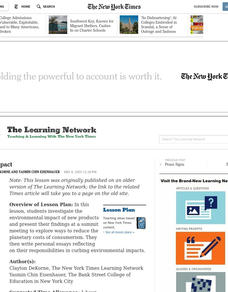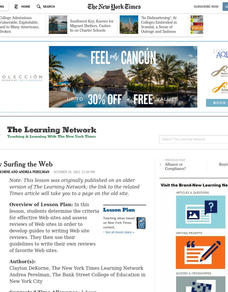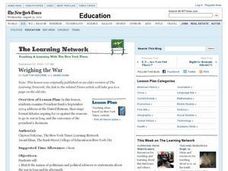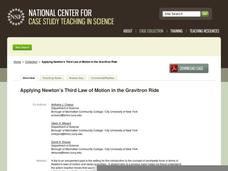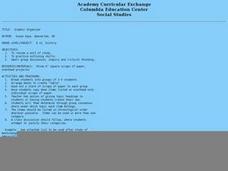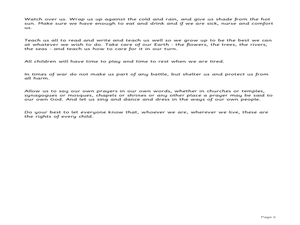Curated OER
Deep Impact
How can acknowledging opposing viewpoints reinforce one's argument? Use this New York Times lesson to study consumerism and the environmental impact of new products. After reading the article "Whether a Hummer or a Hybrid, the Big...
Curated OER
Critically Surfing the Web
The New York Times article “Online Diary,” launches this study of websites and how to assess them. Richly detailed, the lesson includes warm-up activities, procedures, journal prompts, discussion questions, and links to valuable...
Curated OER
Weighing the War
Study opposing viewpoints with this lesson, which examines President Bush's September 2004 address at the United Nations. Middle schoolers study the text of the address, and then stage formal debates arguing for or against the reasons to...
Curated OER
Who Was That Man?
Develop historical analysis and interpretation with your older students. They will study and analyze three given interpretations of Christopher Columbus' life, which includes significant events, his character, and the impact he made on...
National Center for Case Study Teaching in Science
Applying Newton’s Third Law of Motion in the Gravitron Ride
Here is a collection of readings to be discussed in the science classroom. This one is in the form of a dialog between two boys in an amusement park, talking about the forces involved in a Graviton ride. Questions are listed at the...
Curated OER
A Better Class of Journal-ists
Young academics create a current events journal by skimming newspapers for articles that fit defined guidelines for informational texts. After cutting out two articles each week to add to their journals, they write a brief description of...
Curated OER
The Original's Sins
Are history textbooks plagiarized? The New York Times article, “Schoolbooks Are Given F’s in Originality,” looks at this question and forms the basis for a lesson plan on textbooks and plagiarism. The very detailed plan includes resource...
Curated OER
Cite Your Sites!
The New York Times article “Lessons in Internet Plagiarism,” launches a look at how the Internet has increased the prevalence of plagiarism. The richly detailed lesson includes warm-up and wrap-up activities, discussion questions,...
Curated OER
MLA Citation practice
Do your writers have a hard time properly citing their sources in MLA style? Use this SMART board activity to practice these skills in a fun, interactive way. After debating a topic in class (the lesson uses "random drug testing in...
Curated OER
Collaborative Literature Circle For the 21st Century
Using ichat or Edmodo 4th -6th graders participate in an inter-school literature circle. Students from two different schools pair up online through ichat and use a blog to conduct a book circle. This lesson is wonderful; it fully...
Curated OER
Day and Night
Good Night, Moon is a classic little ones absolutely love. It's a sweet book that can be used, as in this lesson plan, to start a conversation about the difference between night and day. After reading the story, the class brainstorms...
Curated OER
Name & Word Wall Activities, Building Blocks: Literacy, Letter Recognition,
Students use the word wall to learn letters, their names, develop print awareness and many other literacy skills.
Curated OER
Graphic Organizing: Early American History
In collaborative groups, young US historians sort cards (each labeled with a single early American event or issue) according to which of the first four presidents was leading the country at the time. Learners copy the events onto a...
PricewaterhouseCoopers
Planning and Money Management: Financial Plan
More planning goes into a budget than a high schooler thinks. Here, they learn about the expected expenses and incomes, along with outside factors such as natural disasters. Learners prepare their own budget and adjust it based on...
Media Education Lab
The Ethics of Propaganda
What are the short and long-term consequences for consumers and producers of modern media propaganda? Class members ponder this essential question as their unit study of ethics of propaganda concludes. After examining two case...
Media Education Lab
Understanding Viral Messages
Imagine advertising for a product but not being paid to do so. Welcome to the world of Viral Messaging. Class members first view a T-Mobile flash mob video that went viral and has been seen by over 14 million viewers. After analyzing the...
National History Day
“Saving the Bear”: The Russian Expeditionary Force of World War One
How have Russian politics affected countries on a global stage? The discussion of the Russian Revolution and World War I begins with an analysis of primary resource letters. Learners finish with a project where they create a timeline of...
Facing History and Ourselves
How Journalists Minimize Bias
Class members are challenged to write a neutral news story about the events they observe in a short video. After sharing their stories in groups and discussing the different perceptions, the class concludes with a video of...
EngageNY
Markup and Markdown Problems
There is a 100 percent chance this resource will help pupils connect percents to financial literacy. Young mathematicians use their knowledge of percents to find markups and markdowns in financial situations in the seventh segment in a...
King Country
Lesson 1: Introductory Class
This first lesson in a unit on Family Life and Sexual Health (FLASH) has class members establishing the rules of behavior that will create a safe environment for the discussion of these sensitive topics.
Health Smart Virginia
Mental Health/Social Emotional Skills
A 7-page packet of activity ideas, lesson plans, and information resources provides instructors of high school freshmen a wealth of materials to support teaching the concepts in a Health Smart unit.
Curated OER
English and Literacy: Children's Rights - Expanded Paragraphs
Students write expanded paragraphs about children's rights. In this writing and children's rights lesson, students listen to Caroline Castle's, For Every Child, noting the points about children's rights on each page. They discuss each of...
Curated OER
Family Album: ESL, Social Studies, Art, Bookmaking, Literacy
Students construct a personalized book with their own family members to practice family vocabulary and literacy in English. This activity would benefit any kindergartener; but is especially aimed at the English Learner.
Curated OER
Literacy Map Activity
Learners write directions using maps and ad, they define driving directions and convert cardinal numbers to there ordinals. They write directions which are given orally in these multi-level literacy activities.
Other popular searches
- Media
- Media Education
- Communications and the Media
- Personal Finance
- Money Management
- Media Literacy
- Math Literacy
- Media Studies
- Adult Literacy
- Mass Media
- Media Organizations
- Digital Media


